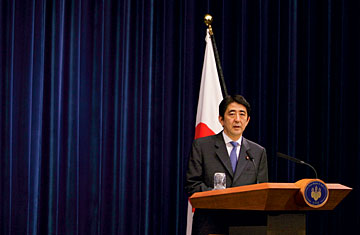
After stubbornly rebuffing calls for his resignation, Abe abruptly reversed course on Sept. 12 and announced he'll relinquish the prime ministership
(2 of 2)
The LDP, which plans to pick Japan's new Prime Minister on Sept. 19, can only hope that their next leader will show a little more stamina. Among the potential candidates are LDP secretary-general Taro Aso and Foreign Minister Nobutaka Machimura. A foreign-policy hawk and self-professed comic-book nut, Aso boasts an impressive political lineage and was runner-up to Abe in the last PM race. But in the faction-riddled LDP, he commands a smaller battalion than Machimura. Whoever wins, Japan may be returning to the bad old days of factional politics, in which Prime Ministers come and go as party infighting overshadows the issues the country really needs to tackle. "We could be heading back to an era of warlord politics," says professor Narita.
It was Abe's predecessor, Junichiro Koizumi, who helped halt Japan's revolving-door system, serving an impressive 51/2 years as Prime Minister, and becoming one of the country's few leaders to have made an impression outside of Japan. Abe had been touted as a successor in that tradition — another outspoken politician who wasn't afraid to use personal charisma to push through tough reforms. But those hopes have now been dashed. "It's like he ran away from the problem, and I find it irresponsible that he quit now," says Chieko Yumoto, a publishing-company clerk in Tokyo. "He's leaving everything for the next Prime Minister."
Abe's resignation certainly puts an already embattled LDP in an even more vulnerable position. Although only a Prime Minister can call a general election, Ozawa's DPJ coalition could spur the public into pushing for a snap poll by year's end. Just hours after Abe's resignation speech, opposition leaders were predicting success in a future election. "The LDP's collapse has begun," says Tsuyoshi Yamaguchi, a senior DPJ member who could become Foreign Minister should his party take power.
Yet the DPJ is also riven by infighting — and the diversity of opinion within its ranks ranges from right-wing nationalists to tree-hugging pacifists. Take the refueling issue: while Ozawa adamantly opposes Japan's active participation in the U.S.-led war on terror, Young Turks in the DPJ have called for continuing Japanese naval support. "Although this may be the beginning of the end of the LDP, the viability of the DPJ as a ruling party is also in question," says Etsushi Tanifuji, a political-science professor at Waseda University in Tokyo. "The Japanese political system is failing."
The cracks in Japan's political foundation come at a particularly inopportune time economically. The country breathed a sigh of relief when a decade-long period of recession and moribund growth officially ended in 2002; Koizumi's government was credited with pulling Japan out of the doldrums. But since then, consumer spending hasn't ticked up significantly. Nor have real wages increased in a decade. That has created the impression that pampered corporations are reaping the benefits of Japan's economic surge, while ordinary citizens are being left behind. "In a country like Japan, with an aging population, the only way you can improve efficiency is through reform," says economist Katz. "But Abe was so focused on foreign policy. He didn't realize you can't stop reforms halfway. It's like stopping in the middle of a river where you'll drown."
Half-baked reforms won't do — not for ordinary Japanese, who want to see some end to the years of belt tightening, and not for the U.S., whose alliance with Japan is a cornerstone of its Asian strategy. As its own resources are stretched ever more thinly around the world, Washington would dearly love to be able to call on a vibrant, self-assured Japan to advance and protect its interests in Asia. For all his nationalist rhetoric, some of which enraged Japan's neighbors, Koizumi managed to do that. His first successor did not, and now there are worrying signs that a slowdown in the global economy is denting confidence in the nation's economic recovery. GDP shrank by 1.2% in the second quarter, a contraction that could continue if credit woes in the U.S. put the brakes on American consumer spending. The U.S. is a major buyer of Japanese exports — and it is Japan's global corporations that have been driving the country's recovery.
Neither the DPJ nor the LDP appear to have a coherent plan to tackle a slowdown. On Wednesday, the Tokyo Stock Exchange dipped on news of Abe's imminent resignation. One of the few stocks to gain on the day was that of a secondhand-manga retailer called Mandarake, which rose nearly 13% on speculation that comic-loving Aso might be Japan's next Prime Minister. Aso and the LDP will have to come up with something better than comics to erase the memory of Abe's failure to provide the leadership that Japan so obviously needs.
